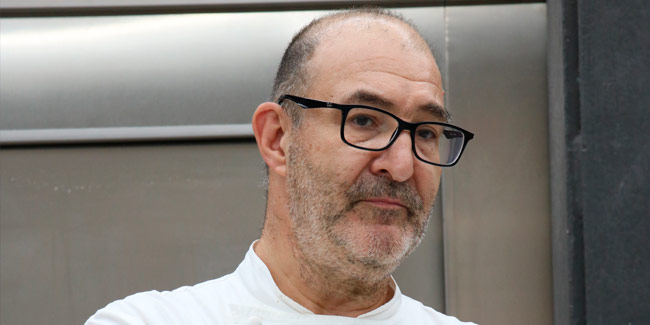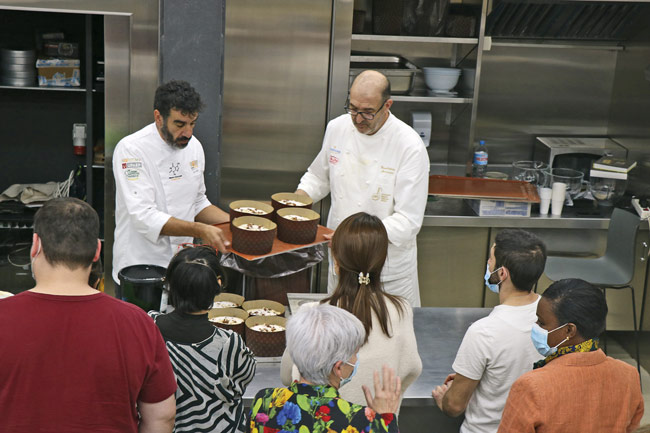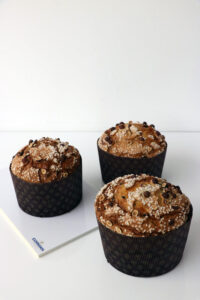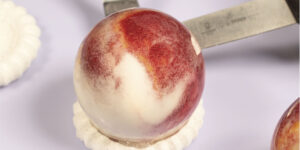Categories Pastry Chef Articles
Giambattista Montanari: ‘As an Italian, it is a source of pride that panettone triumphs in other countries’

After 40 years in the profession, Giambattista Montanari continues to discover how much he can still learn within his great specialty, fermented doughs with sourdough. He came to the job accidentally and when his father saw that he had to get up at four in the morning he looked for another job in a glass factory, but it was already too late, pastry had entrapped him. We chatted with him and he tells us, among other things, that without experience there is no art, only chance.
Who is Giambatista Montanari? How did you get into the world of pastry and fermented doughs? It was kind of accidental, right?
I am a person who is in love with their job, and very happy to do what I do. But I have to say that I did come to pastry by accident. I was looking for a job as an apprentice waiter and I accidentally entered a pastry shop that was looking for someone for the workshop. The passion for fermented doughs and sourdough came to me little by little. First I started with the powders, the semi-finished ones, and later I discovered what happens in the dough due to the effect of natural yeast. It’s something I’ve been passionate about for over 40 years.
How and with whom did you train? Who were your teachers or the professionals who influenced you when you were beginning?
Well, I have to mention a professional who is not well-known in the trade, Roberto Rambaldi. And then there are two great masters from whom I have learned a lot and continue to learn, Leonardo di Carlo and Iginio Massari. Their example and the possibility of comparing my knowledge with theirs are things that have made me grow a lot.
“We are just at the beginning of knowing this wonderful world of fermented doughs”

You ran several pastry shops, but there came a time when you decided to dedicate yourself to consulting. Don’t you miss the pace of working in the workshop?
The change in activity had to do with another accident, in this case a car accident. I was hospitalized for 70 days and when I recovered I realized that I could not keep up with a workshop with many employees and a very large production. Then, the possibility of working as a technician and consultant with Corman arose, a company to which I am very grateful because it has allowed me to investigate and specialize even more in this part of the trade.
Why sourdoughs and natural yeast? Why not chocolate or caramel?
Because doughs are living products that are changing, that evolve. I also like chocolate. But the moment when a product like panettone is transformed in the oven is magical.
You say that to obtain a good result in a fermented product, it is necessary to know what happens inside the dough. What is happening or should happen?
As Aristotle said, “Experience gave rise to art, while inexperience gave rise to chance.” We need experience, knowledge, and research to find out what elements are involved in a dough, what its nature is and what its behavior is. If we do not understand what is happening, we cannot “produce” that art that Aristotle spoke of, which in our case would be to produce quality dough.
As Aristotle said, “Experience produces art, while inexperience produces chance.”
What do you think of chemical yeast? Is it much worse than sourdough?
Each product requires its own ingredients and specific process. And in the case of the panettone, for example, chemical yeast would never provide that smooth, soft structure, that conservation, even that characteristic flavor. It would be an incomplete panettone. The so-called pressed yeast can be of great help for brioche, pizza, or bread, but panettone needs the participation of the sourdough.
You are the author of two books, Ph 4.1 and Omnia Fermenta. Have you kept something to yourself or have you said everything you’ve had to say?
Look, I think we are just at the beginning of knowing this wonderful world of sourdoughs. A new book could be made every five years with the way we advance and discover. It is something almost infinite.
“Panettone is, as we say in Italy, ‘a product of substance’, meaning that it is essential”
How do you explain the current panettone fever around the world?
As an Italian and as a pastry chef, it is a source of pride for me that a product as special and as beautiful as the panettone is made, marketed, and is successful in other countries, even outside of the Christmas holidays. It is a great success for Italian excellence.
Do you think it’s a passing fad and will it end up being just another Christmas product?
I don’t think it’s a fad because panettone is an exceptional product. It has nothing to do with other trends such as cake design. Panettone is, as we say in Italy, “a product of substance”, meaning that it is essential. You can lower the interest a little but it will stay up, for sure.
“If your panettone is acidic, it is because your sourdough is surely acidic, but if you don’t know why this happens, it is difficult for you to solve it”
Can you tell me whose are the three best panettone you’ve ever tasted?
One surely is the Beniamino Bazzoli panettone. Another is a panettone I made myself that after five months was still soft and the raisins weren’t rancid. And the third might be a hazelnut glazed panettone from Iginio Massari.



